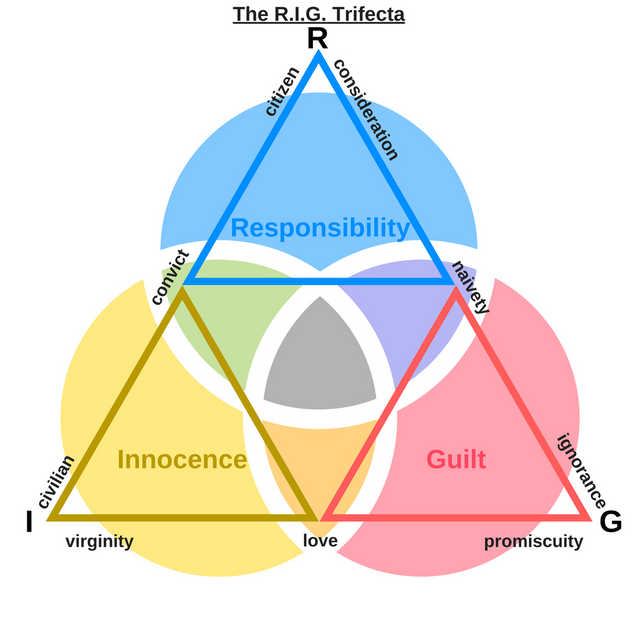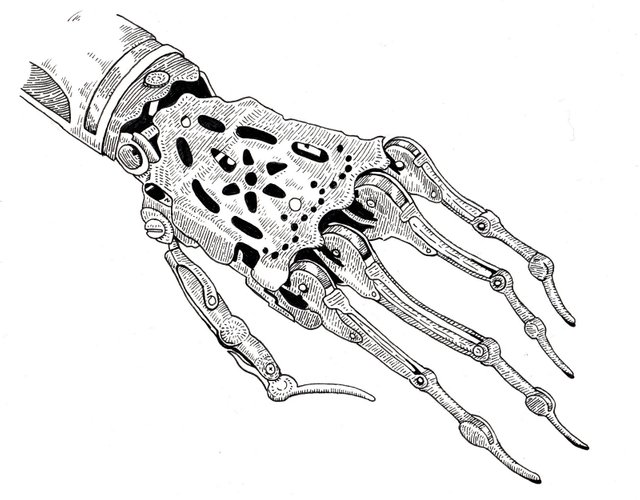Innocence, Guilt, and Responsibility

Innocence, Guilt, and Responsibility
A discussion about love
Many cultures around the world, and throughout time, have equated the loss of virginity with the loss of innocence. This perspective on love and sex is neither entirely accurate nor is it entirely false. In a purely linguistic sense, innocence is the opposite of guilt, and in this sense losing one’s virginity is tantamount to a crime. However, innocence is also synonymous with naivety. In this regard, the loss of virginity is the introduction to a new sort of awareness. This new awareness can for responsible, consenting partners usher in a new, even purer form of innocence; a form of innocence that is no longer naive but an active, mindful choice. The theory can also be applied to many other aspects of life such as crime and punishment.
In times of antiquity a woman was not fit for marriage if she was not a virgin. Prostitutes are still regarded by modern society as deeply sub-alternate. Sex work remains illegal in a vast number of modern legal systems. People are always tempted towards new pleasures, whether legal or not, and entering into the world of sex is seen by many as a form of matriculation. Young men laud and congratulate their peers who have finally dipped their toes into these new adult waters. Neither of these perspectives, for either gender role, is completely devoid of truth, nor is either perspective false in an absolute sense. The key to determining the truth factor to these social constructs is to think in terms of responsibility.
Responsibility, guilt, and innocence make up a rather strange ménage à trois. To examine their relationship we refer to the diagram below:

The lines of the triangle each represent an example where the relationship can be examined. The bottom line, moving from point “I” to “G”, refers to the example of love as a loss of innocence. Where a person indulges in the carnal desire one leaves behind a certain naivety. One now has knowledge of the other’s body in the context of sex. In this way the loss of innocence is true. However, this loss of innocence does not necessitate the burden of guilt. Guilt is only assumed if one intercourses irresponsibly. A responsible partner cares about the physical pleasure and the mental well-being of the other. The responsible, sexually-active adult is a ‘lover’. The irresponsible, sexually-active adult is little more than a ‘fucker’; going through the motions with only their own gratification in mind. In the context of love and sex, responsibility offers one the choice of becoming guilty through the loss of innocence or the option of enhancing one’s innocence by virtue of the fact that it is chosen.
The remaining axes on the triangle represent two more options to help flesh out how responsibility mitigates feelings of guilt. The line on the right, moving from “G” to “R”, represents a person who is ignorant. An ignorant person, for example someone who is racist or bigoted, is guilty because their ignorance is chosen. The ignorant person chooses to deny facts in favour of already established prejudices. Sometimes, however, a person who seems bigoted or racist may simply be naive. A child who has been raised by racist parents is not responsible for their incorrect beliefs, or a person who simply does not know the nuances of a foreign culture may misunderstand and thereby appear to be prejudiced. This does not mean that they are guilty, it simply means that they have not yet been given the choice to behave correctly yet. When an ignorant person admits their ignorance, they can become naive. When a naive person learns and challenges their prejudices they can become considerate.
The final axis of the diagram is the line moving from “R” to “I”. A responsible member of society is any adult who navigates our complex social contracts with careful and actively considerate participation. Such a person is called a citizen. Such a person is neither innocent in the sense of naivety, nor are they guilty in either the legal-judicial sense or the emotionally burdened sense. A civilian, in the context of this discussion, is a person who benefits from all of the structures that support a society at large. Children attending school, people who do not exercise their right to vote, the passive participants in the greater social context. However being a model citizen is not always easy, and often times people slip up. People commit crimes every day and at all hours. Murder, rape, theft, and robbery are all still elements in the modern human habitat. The people who perpetrate these heinous acts are in the eyes of the law guilty once convicted. Ideally, convicts are incarcerated in a jail facility with the hopes of rehabilitation. This rehabilitation process can in theory absolve a person of their guilt and reform them into responsible members of society (a.k.a. a citizen). But if a person who perpetrates a crime pleads innocent then they are acting irresponsibly and are thus guilty of additional criminality.
Awareness and choice can be seen as integral factors for responsibility. A naive person can remain innocent by becoming aware of, and then choosing, the right course of action. A criminal can return to responsible living by accepting guilt and the consequences thereof. An ignorant person will remain guilty for as long as he chooses to stay unaware. To love is a matriculation if done so mindfully. Choose love, everybody. But these are just my opinions on the matter, as ever feel free to please ignore.

Stay in touch @pleaseignore .